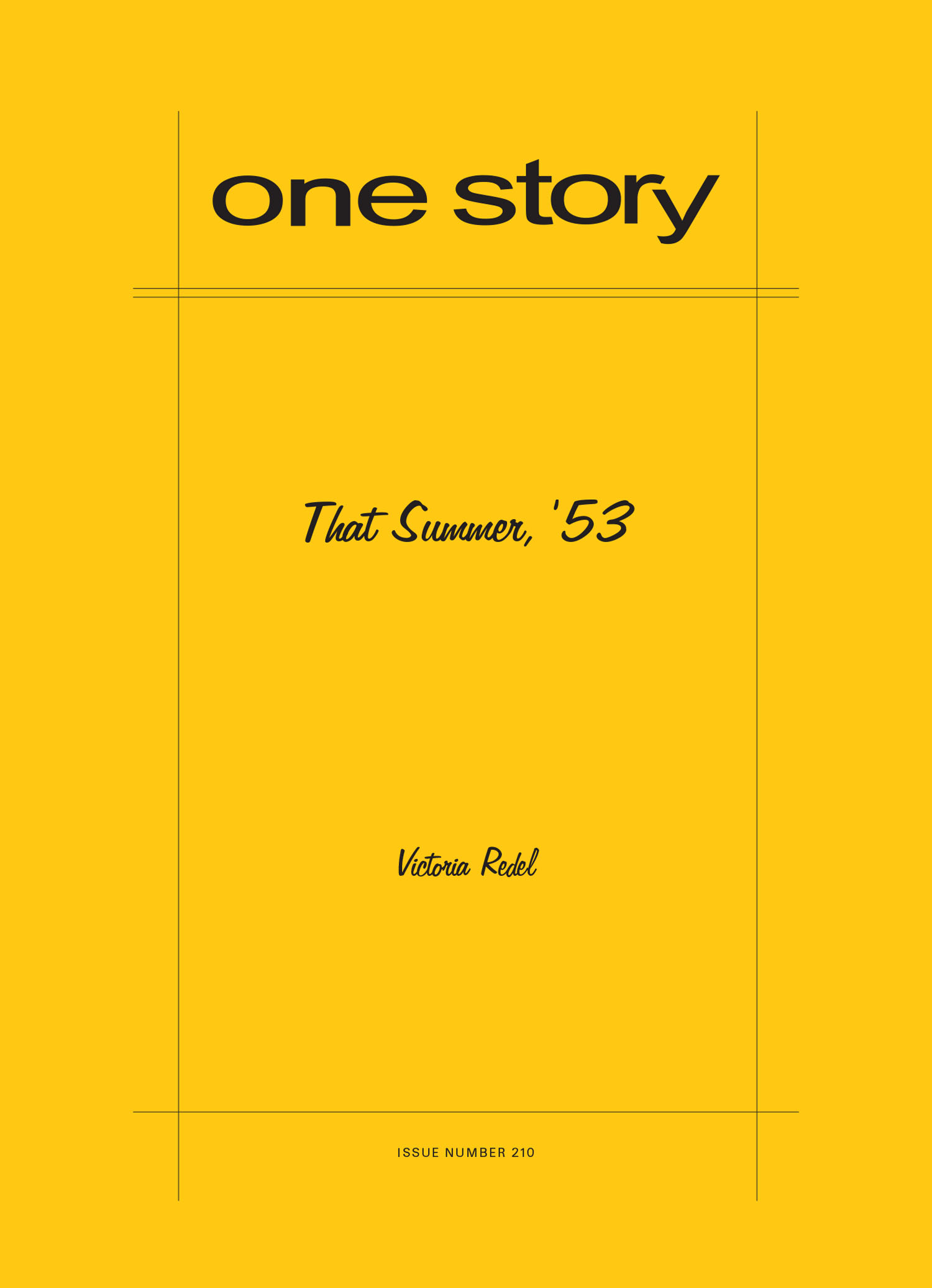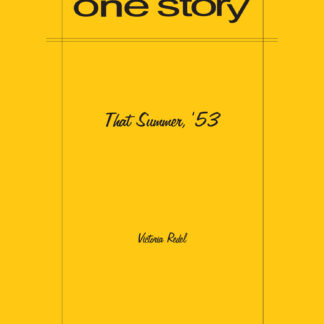
That Summer, ‘53
$2.50
117 in stock
Excerpt
Sidney King told me it was the last of his rental bungalows. “That there’s even one available is pretty much a miracle,” he said over the phone. “You’ll see. It’s Shangri-La up here. Once you’ve rented, there’s no walking away.”
Sure enough as soon as we turned out on the parkway it felt like Shangri-La. The Sawmill Parkway had just been completed; it was my first time driving the hills and curves. The trees as we drove north were a tender spring green. I looked over at my wife; a bright flowered scarf tied around under her chin, our three year old daughter Tanya cupped in her lap and thought I was a lucky man.
“It’s good for the baby, this country air.”
Though the windows were rolled up Ella drew a deep theatrical breath.
“But you’re a city girl,” I teased.
This was our joke, since Ella was born in Moscow and I was born in a small city called Reni, near the Black Sea. She liked to say that even if I studied hard every minute, I’d never become as cultured as she was. And though I argued that I’d lived in Lucerne and Paris before New York, that I spoke five languages compared to her pitiful two, and that I did not falsely Americanize my name as she had from Elisheva to Ella, My wife’s tongue tsked her teeth. “Say what you want, Serge. Your little Reni was never Moscow.”
Victoria Redel
Victoria Redel is the author of four books of fiction and three books of poetry, most recently the poetry collection Woman Without Umbrella and the short story collection Make Me Do Things (Four Way Books). Her novel The Border of Truth weaves the situation of refugees and a daughter’s awakening to the history and secrets of her father’s survival and loss. Redel’s debut novel Loverboy (paperback: Harcourt) won the Graywolf S. Mariela Gable novel award and was adapted for a feature film directed by Kevin Bacon. Her work has appeared in numerous anthologies and journals including Poems That Make Grown Men Cry, The Norton Introduction to Literature, Granta.com, O the Oprah magazine, Salmagundi, NOON, Elle, Bomb. Redel is on the faculty of Sarah Lawrence College. Visit www.victoriaredel.com for more information.
Hannah Tinti on “That Summer, ‘53”
I’m writing this in the final moments of summer, which always feel both relaxing and fraught. I spend every minute I can outdoors, enjoying the last of the good weather, and at the same time, I wonder at how fast the days have gone by. Luckily, I have Victoria Redel’s remarkable story, “That Summer, ’53,” to help me remember the smell of BBQ cooking, the cool joy of jumping into a cold lake, and the lazy stretch of a summer night with friends, sipping drinks and watching the sun filter pink and orange through the trees. Set in 1953, this bucolic lakeside life is the American dream for Serge Solta and his young Russian family, their own little piece of Shangri-La. But things are more complicated than they seem in Serge’s work life and his marriage. The McCarthy hearings and the Rosenberg executions are broadcasting through everyone’s TV sets, and soon Serge finds himself caught between two worlds, muffling his misgivings with Seabreeze cocktails and the rhythm of Pérez Prado’s “Mambo Number Five” while trying to keep Shangri-La from slipping through his fingers. Check out Victoria Redel’s Q&A with us to hear the family history behind this sharply-turned tale. Then it’s time to get out your vintage cocktail shaker, fix yourself a Gin-and-It, open the pages of “That Summer, ’53,” and enjoy a literary Indian summer.
Q&A by Hannah Tinti
- HT: What was the seed of this story? What was the first thing you wrote?
- VR: I’ve always pulled, distorted and reimagined aspects of family biography as ballast for fiction. So, to share a few seeds. My maternal grandfather was indeed a Soltanitsky born in Alexandria, Egypt. And there was an Uncle Matthus who, after a long political imprisonment in Romania in the 20’s, moved to Russia where he was promptly imprisoned under Stalin. As for the first thing I wrote—it was indeed the story’s opening sentence. When I wrote it, I had a pretty clear image of the man who was speaking. And soon I understood his problem.
- HT: What was the most challenging aspect of writing this story?
- VR: I’m not a writer who wants to include much backstory. Yet this was a story that seemed to demand context for the characters. How much? How little? This was a big challenge for me.
- HT: The year (Where did the idea for this story come fromCan you tell us a little about the titleWhat is the most interesting fact you learned while writing this (about the world, not yourself)How long did it take you to complete this story) is a big part of this story, with tiny facts dropped throughout the piece, from the Rosenberg executions to the Korean Armistice. Why did you decide on that particular moment in time, and that particular summer, to tell this family’s tale?
- VR: Serge and Ella are part of the post WWII wave of immigrants. Questions of assimilation are of real interest to me and certainly this is a piece of their marital problems. What is patriotism? How does an individual live in relation to her/his moment in history? These are interesting questions.
- HT: In this story, you perfectly capture the temporal beauty of summer evenings. Is there a real setting that you drew on for your wonderful descriptions of the lake?
- VR: My family has a tiny three season cabin on a lake, more rustic even than the one Serge and Ella rent. It was once a summer rental community. I love the summer on the lake, everything from friendships nurtured over evening dinners to the sound of the August cicadas. These communities at one point dotted many lakes upstate New York.
- HT: The Mambo dancing in “That Summer ’What is the most interesting fact you learned while writing this (about the world, not yourself)How long did it take you to complete this story” is so much fun. What kind of research did you have to do for this, and how did it find its way into the story?
- VR: I wanted to give Serge something that he loved, something for which he had a real feel and skill. Dancing occurred to me because of its physicality. Also because it brought him out into NYC at night. I wanted the pulse of something really different than the quiet of the lake. I knew it was a Mambo moment in the country from my mom who loved the mambo and the rhumba. And I loved what it might bring to the story since the Mambo crossed race and nationality. Suddenly Blacks, Whites and Latinos were dancing in clubs together. This was new. In a story where hiding ethnicity is a central theme, where the mounting Red Scare wreaked havoc on lives, the Mambo is too good a counterpoint not to enjoy as a writer.
- HT: Everyone seems to be hiding their true identity in this piece—from Ella and Serge pretending to be French, and Sid pretending to be inexperienced in business and overly patriotic. Is identity a theme you find yourself exploring often?
- VR: I guess I do wind up writing about identity quite a bit. I suppose it might be bred in the bone. I’m first generation American on both sides of my family. The complication of identity was a constant in our house where, on the one hand, we were encouraged to be “entirely American” although we were also constantly taught to be vigilant because “we were not ever truly American.” I also grew up on the stories of identity in various family members struggles—from my one grandfather’s flight from Poland and my other grandfather’s life in Egypt. My parents had thrilling stories of hiding, escape and luck. And always there was the shadow of family that perished.
- HT: You write both poetry and fiction. Do you find one form feeds the other, or are they entirely different animals?
- VR: I do write both. And I’m so happy and grateful to both write and publish both. It’s not exactly like speaking more than one language—maybe it’s more that I have these different forms available, each with distinct demands and opportunities.
- HT: How long did it take you to complete this story?
- VR: The first draft came kind of quickly. Serge’s voice was right there for the having. It was the revising the story—getting it right—now, that’s where the stamina comes in.
- HT: What are you working on now?
- VR: I’m working hard on a novel.
- HT: What is the best bit of advice about writing you have ever received?
- VR: Show up show up show up. And then to give yourself permission. To make mistakes. Not to be a smarty-pants. To write something worthy of people’s precious time.
